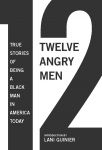Ever since you were a toddler, you knew your colors.
 |
Your mother would ask you to get your blue car and blue was what she got. You’d never bring her something red if she asked for yellow.
Green army men? Oh, yeah. You could find them because you learned your colors, just as naturally as you learned to talk.
But are you “color blind”?
According to the authors of the new book, America is definitely not; in fact, racial profiling has been going on for centuries and is more widespread than ever.
When Cambridge police questioned Henry Louis Gates, Jr. on the front porch of his home nearly two years ago, lots of people ruefully shook their heads. Specifically, African-American men shook theirs in understanding.
Yep. Been there, often.
As Lani Guinier points out in her introduction, Americans like to believe that we live in a post-racial society. We have an African-American president. African-Americans sit in powerful positions in politics, higher education, business, and the military. But racial profiling exists—as evidenced by the dozen essays in this book.
In the first essay, “The Bill of Rights for Black Men,” author Bryonn Bain says that there is “a special Bill of Rights for nonwhite people in the United States…” He and his friends know all about it. They were arrested for the “crime” of walking away from the scene of a disturbance they didn’t commit.
Solomon Moore is a Pulitzer Prize honorable mention winner. He’s also of mixed race, and that’s the only thing that mattered to the police who slammed him into the hood of a squad car while he was doing his job for The New York Times. In “Reporting While Black,” he surprises readers with a twist on racism.
Not even being a member of Congress matters. In “Just-Us,” the Honorable Daniel K. Davis writes about driving home in his car with three other passengers at around midnight on a Sunday night. Davis, who is “a pretty solid, law-abiding, civic-minded, Christian-minded, good-guy citizen,” was stopped by a policeman.
He was driving the speed limit. There was no burnt-out light or loud stereo. Nobody was drinking.
“I felt that I was stopped for driving while being Black,” he says.
Why read the book when you live the story?
The reason to read this book is because it does one important thing: it bluntly uncovers a subject that needs discussion. And what else can be done?
Read the last chapter…
No doubt, “12 Angry Men” is going to spark some angry discussion and that’s a good thing. This book starts by laying out the issue in Black and White.
(“12 Angry Men” edited by Gregory S. Parks and Matthew W. Hughey, introduction by Lani Guinier, The New Press, $24.95, 179 pages.)